TLAW 402 Company Law Assignment: Directors' Duties and Penalties
VerifiedAdded on 2022/11/14
|9
|2085
|5
Homework Assignment
AI Summary
This assignment solution addresses a Corporation Law case study involving the directors of Sonu Pty Ltd. The case examines the responsibilities of directors, particularly Shilpa and Sonal, in managing the company's finances and administrative affairs. The solution analyzes potential breaches of directors' duties under the Corporations Act 2001 (Cth), including the duty of care, good faith, and the prevention of insolvent trading. It assesses the directors' liabilities for actions such as failing to maintain financial records and misusing company funds. The solution explores the powers of a liquidator to pursue directors for such breaches, including the potential for civil and criminal penalties. The analysis considers relevant sections of the Act, such as sections 180-184, 344, 588G, 588FDA, and 588FGA, to determine the consequences faced by the directors. The conclusion suggests that both directors are likely to face penalties for their actions, with Shilpa, the managing director, bearing greater responsibility. The solution also references legal precedents to support its arguments.
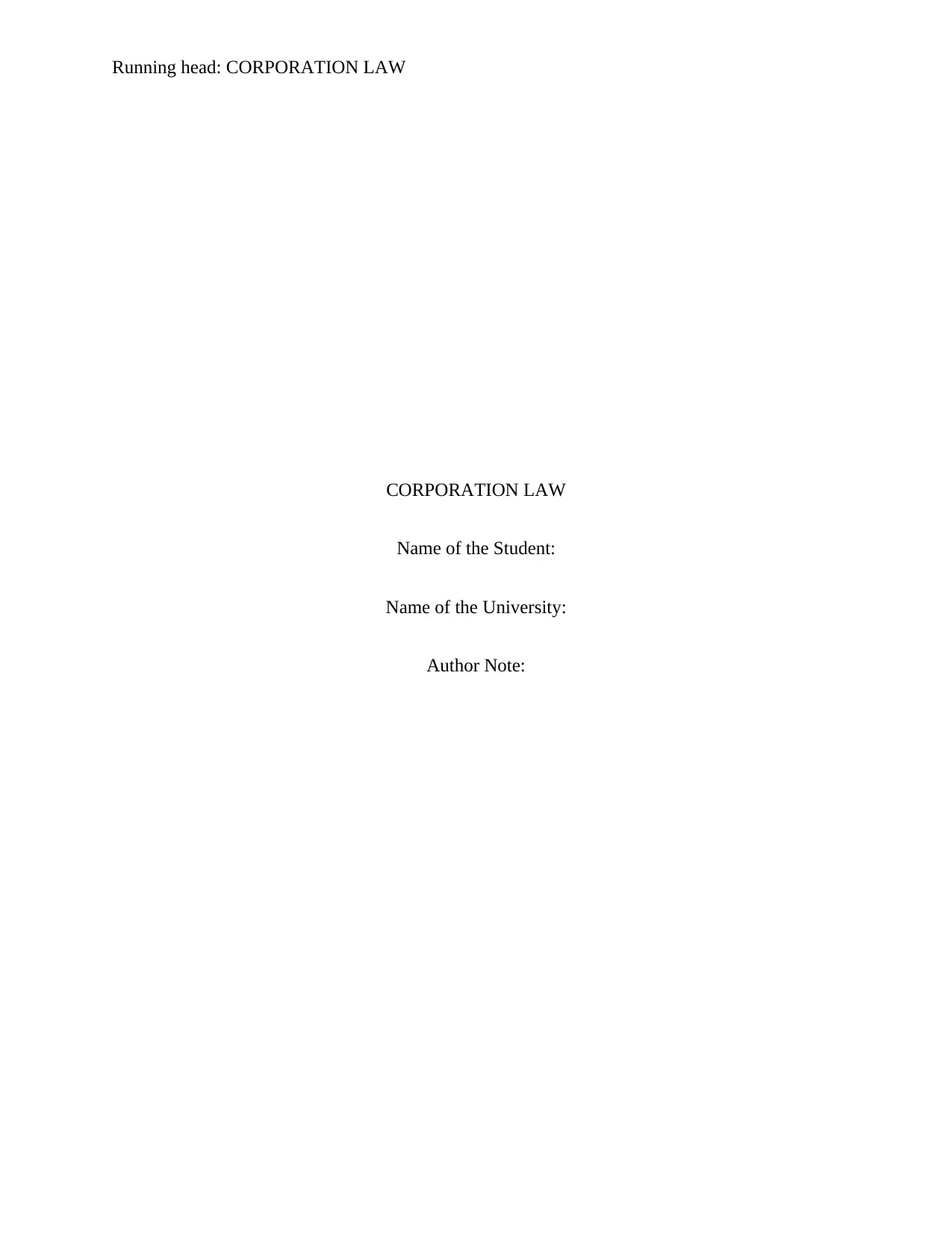
Running head: CORPORATION LAW
CORPORATION LAW
Name of the Student:
Name of the University:
Author Note:
CORPORATION LAW
Name of the Student:
Name of the University:
Author Note:
Paraphrase This Document
Need a fresh take? Get an instant paraphrase of this document with our AI Paraphraser
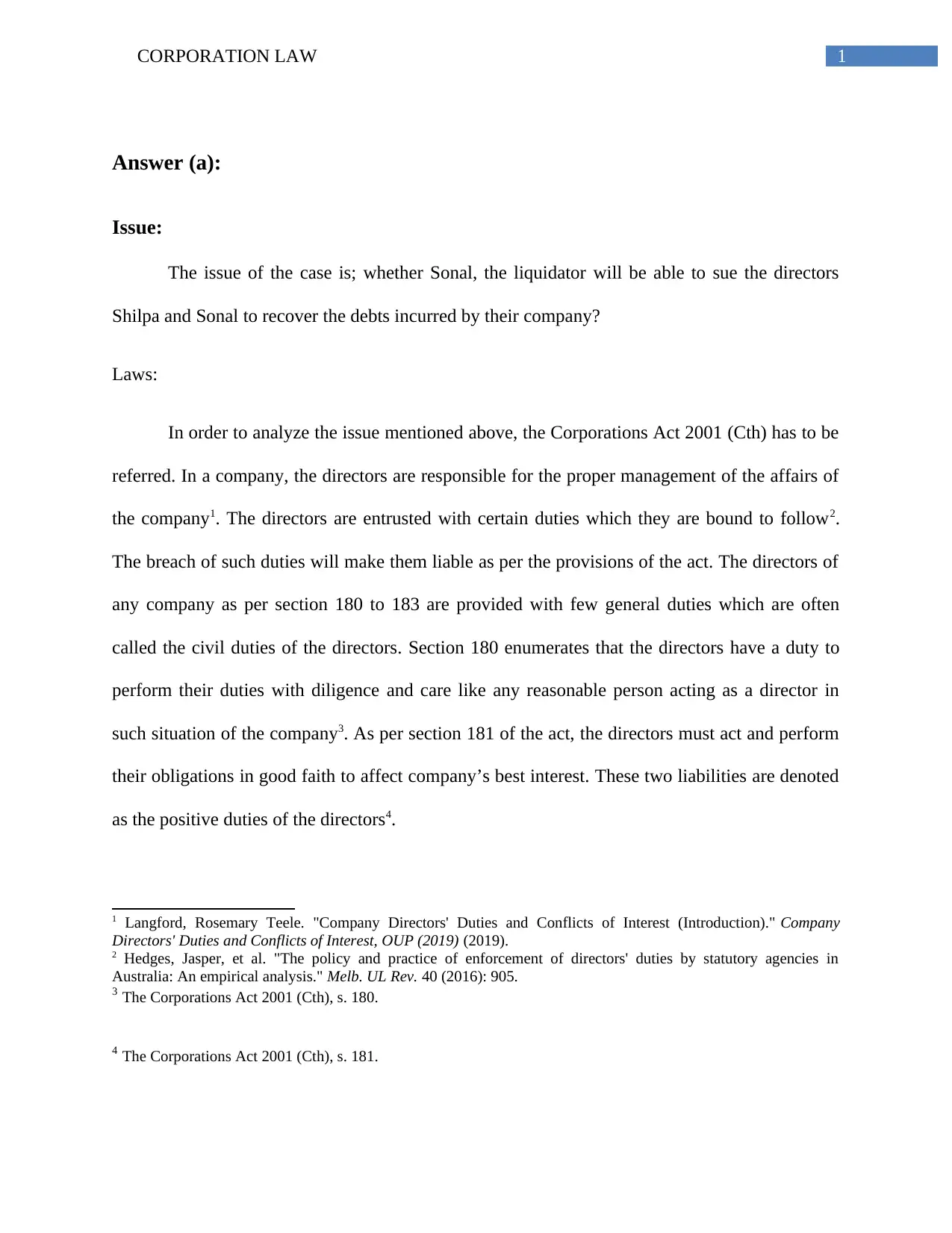
1CORPORATION LAW
Answer (a):
Issue:
The issue of the case is; whether Sonal, the liquidator will be able to sue the directors
Shilpa and Sonal to recover the debts incurred by their company?
Laws:
In order to analyze the issue mentioned above, the Corporations Act 2001 (Cth) has to be
referred. In a company, the directors are responsible for the proper management of the affairs of
the company1. The directors are entrusted with certain duties which they are bound to follow2.
The breach of such duties will make them liable as per the provisions of the act. The directors of
any company as per section 180 to 183 are provided with few general duties which are often
called the civil duties of the directors. Section 180 enumerates that the directors have a duty to
perform their duties with diligence and care like any reasonable person acting as a director in
such situation of the company3. As per section 181 of the act, the directors must act and perform
their obligations in good faith to affect company’s best interest. These two liabilities are denoted
as the positive duties of the directors4.
1 Langford, Rosemary Teele. "Company Directors' Duties and Conflicts of Interest (Introduction)." Company
Directors' Duties and Conflicts of Interest, OUP (2019) (2019).
2 Hedges, Jasper, et al. "The policy and practice of enforcement of directors' duties by statutory agencies in
Australia: An empirical analysis." Melb. UL Rev. 40 (2016): 905.
3 The Corporations Act 2001 (Cth), s. 180.
4 The Corporations Act 2001 (Cth), s. 181.
Answer (a):
Issue:
The issue of the case is; whether Sonal, the liquidator will be able to sue the directors
Shilpa and Sonal to recover the debts incurred by their company?
Laws:
In order to analyze the issue mentioned above, the Corporations Act 2001 (Cth) has to be
referred. In a company, the directors are responsible for the proper management of the affairs of
the company1. The directors are entrusted with certain duties which they are bound to follow2.
The breach of such duties will make them liable as per the provisions of the act. The directors of
any company as per section 180 to 183 are provided with few general duties which are often
called the civil duties of the directors. Section 180 enumerates that the directors have a duty to
perform their duties with diligence and care like any reasonable person acting as a director in
such situation of the company3. As per section 181 of the act, the directors must act and perform
their obligations in good faith to affect company’s best interest. These two liabilities are denoted
as the positive duties of the directors4.
1 Langford, Rosemary Teele. "Company Directors' Duties and Conflicts of Interest (Introduction)." Company
Directors' Duties and Conflicts of Interest, OUP (2019) (2019).
2 Hedges, Jasper, et al. "The policy and practice of enforcement of directors' duties by statutory agencies in
Australia: An empirical analysis." Melb. UL Rev. 40 (2016): 905.
3 The Corporations Act 2001 (Cth), s. 180.
4 The Corporations Act 2001 (Cth), s. 181.
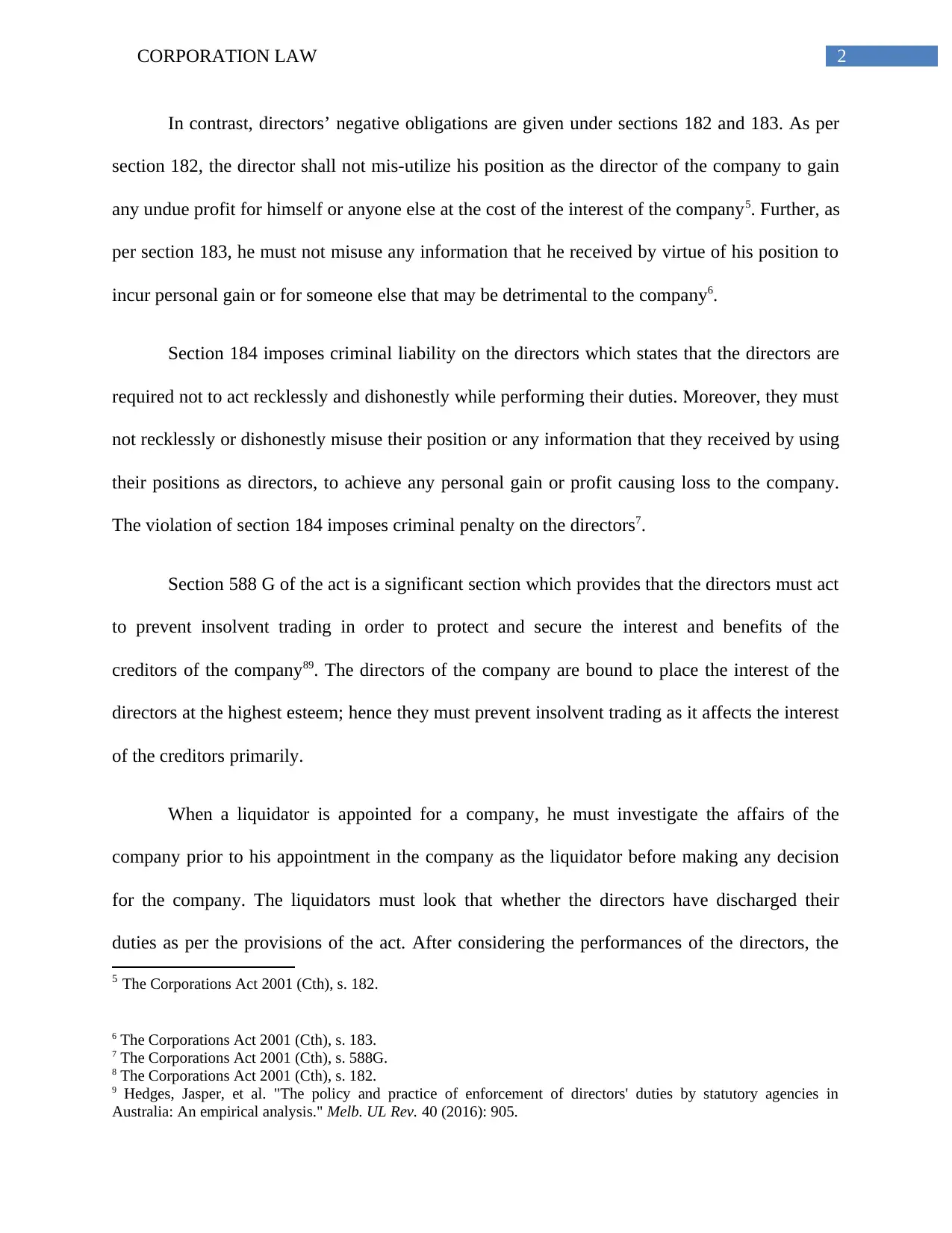
2CORPORATION LAW
In contrast, directors’ negative obligations are given under sections 182 and 183. As per
section 182, the director shall not mis-utilize his position as the director of the company to gain
any undue profit for himself or anyone else at the cost of the interest of the company5. Further, as
per section 183, he must not misuse any information that he received by virtue of his position to
incur personal gain or for someone else that may be detrimental to the company6.
Section 184 imposes criminal liability on the directors which states that the directors are
required not to act recklessly and dishonestly while performing their duties. Moreover, they must
not recklessly or dishonestly misuse their position or any information that they received by using
their positions as directors, to achieve any personal gain or profit causing loss to the company.
The violation of section 184 imposes criminal penalty on the directors7.
Section 588 G of the act is a significant section which provides that the directors must act
to prevent insolvent trading in order to protect and secure the interest and benefits of the
creditors of the company89. The directors of the company are bound to place the interest of the
directors at the highest esteem; hence they must prevent insolvent trading as it affects the interest
of the creditors primarily.
When a liquidator is appointed for a company, he must investigate the affairs of the
company prior to his appointment in the company as the liquidator before making any decision
for the company. The liquidators must look that whether the directors have discharged their
duties as per the provisions of the act. After considering the performances of the directors, the
5 The Corporations Act 2001 (Cth), s. 182.
6 The Corporations Act 2001 (Cth), s. 183.
7 The Corporations Act 2001 (Cth), s. 588G.
8 The Corporations Act 2001 (Cth), s. 182.
9 Hedges, Jasper, et al. "The policy and practice of enforcement of directors' duties by statutory agencies in
Australia: An empirical analysis." Melb. UL Rev. 40 (2016): 905.
In contrast, directors’ negative obligations are given under sections 182 and 183. As per
section 182, the director shall not mis-utilize his position as the director of the company to gain
any undue profit for himself or anyone else at the cost of the interest of the company5. Further, as
per section 183, he must not misuse any information that he received by virtue of his position to
incur personal gain or for someone else that may be detrimental to the company6.
Section 184 imposes criminal liability on the directors which states that the directors are
required not to act recklessly and dishonestly while performing their duties. Moreover, they must
not recklessly or dishonestly misuse their position or any information that they received by using
their positions as directors, to achieve any personal gain or profit causing loss to the company.
The violation of section 184 imposes criminal penalty on the directors7.
Section 588 G of the act is a significant section which provides that the directors must act
to prevent insolvent trading in order to protect and secure the interest and benefits of the
creditors of the company89. The directors of the company are bound to place the interest of the
directors at the highest esteem; hence they must prevent insolvent trading as it affects the interest
of the creditors primarily.
When a liquidator is appointed for a company, he must investigate the affairs of the
company prior to his appointment in the company as the liquidator before making any decision
for the company. The liquidators must look that whether the directors have discharged their
duties as per the provisions of the act. After considering the performances of the directors, the
5 The Corporations Act 2001 (Cth), s. 182.
6 The Corporations Act 2001 (Cth), s. 183.
7 The Corporations Act 2001 (Cth), s. 588G.
8 The Corporations Act 2001 (Cth), s. 182.
9 Hedges, Jasper, et al. "The policy and practice of enforcement of directors' duties by statutory agencies in
Australia: An empirical analysis." Melb. UL Rev. 40 (2016): 905.
⊘ This is a preview!⊘
Do you want full access?
Subscribe today to unlock all pages.

Trusted by 1+ million students worldwide
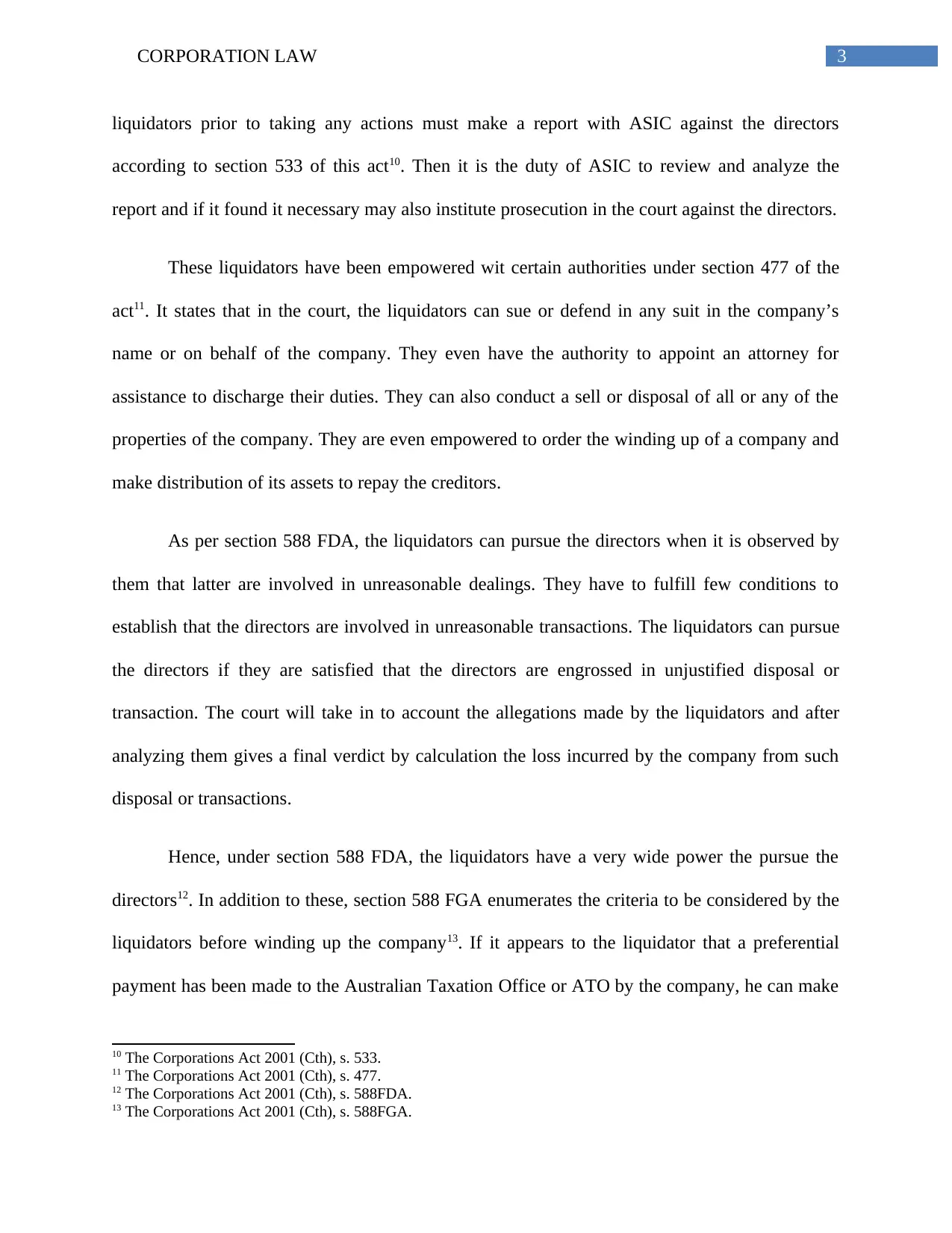
3CORPORATION LAW
liquidators prior to taking any actions must make a report with ASIC against the directors
according to section 533 of this act10. Then it is the duty of ASIC to review and analyze the
report and if it found it necessary may also institute prosecution in the court against the directors.
These liquidators have been empowered wit certain authorities under section 477 of the
act11. It states that in the court, the liquidators can sue or defend in any suit in the company’s
name or on behalf of the company. They even have the authority to appoint an attorney for
assistance to discharge their duties. They can also conduct a sell or disposal of all or any of the
properties of the company. They are even empowered to order the winding up of a company and
make distribution of its assets to repay the creditors.
As per section 588 FDA, the liquidators can pursue the directors when it is observed by
them that latter are involved in unreasonable dealings. They have to fulfill few conditions to
establish that the directors are involved in unreasonable transactions. The liquidators can pursue
the directors if they are satisfied that the directors are engrossed in unjustified disposal or
transaction. The court will take in to account the allegations made by the liquidators and after
analyzing them gives a final verdict by calculation the loss incurred by the company from such
disposal or transactions.
Hence, under section 588 FDA, the liquidators have a very wide power the pursue the
directors12. In addition to these, section 588 FGA enumerates the criteria to be considered by the
liquidators before winding up the company13. If it appears to the liquidator that a preferential
payment has been made to the Australian Taxation Office or ATO by the company, he can make
10 The Corporations Act 2001 (Cth), s. 533.
11 The Corporations Act 2001 (Cth), s. 477.
12 The Corporations Act 2001 (Cth), s. 588FDA.
13 The Corporations Act 2001 (Cth), s. 588FGA.
liquidators prior to taking any actions must make a report with ASIC against the directors
according to section 533 of this act10. Then it is the duty of ASIC to review and analyze the
report and if it found it necessary may also institute prosecution in the court against the directors.
These liquidators have been empowered wit certain authorities under section 477 of the
act11. It states that in the court, the liquidators can sue or defend in any suit in the company’s
name or on behalf of the company. They even have the authority to appoint an attorney for
assistance to discharge their duties. They can also conduct a sell or disposal of all or any of the
properties of the company. They are even empowered to order the winding up of a company and
make distribution of its assets to repay the creditors.
As per section 588 FDA, the liquidators can pursue the directors when it is observed by
them that latter are involved in unreasonable dealings. They have to fulfill few conditions to
establish that the directors are involved in unreasonable transactions. The liquidators can pursue
the directors if they are satisfied that the directors are engrossed in unjustified disposal or
transaction. The court will take in to account the allegations made by the liquidators and after
analyzing them gives a final verdict by calculation the loss incurred by the company from such
disposal or transactions.
Hence, under section 588 FDA, the liquidators have a very wide power the pursue the
directors12. In addition to these, section 588 FGA enumerates the criteria to be considered by the
liquidators before winding up the company13. If it appears to the liquidator that a preferential
payment has been made to the Australian Taxation Office or ATO by the company, he can make
10 The Corporations Act 2001 (Cth), s. 533.
11 The Corporations Act 2001 (Cth), s. 477.
12 The Corporations Act 2001 (Cth), s. 588FDA.
13 The Corporations Act 2001 (Cth), s. 588FGA.
Paraphrase This Document
Need a fresh take? Get an instant paraphrase of this document with our AI Paraphraser
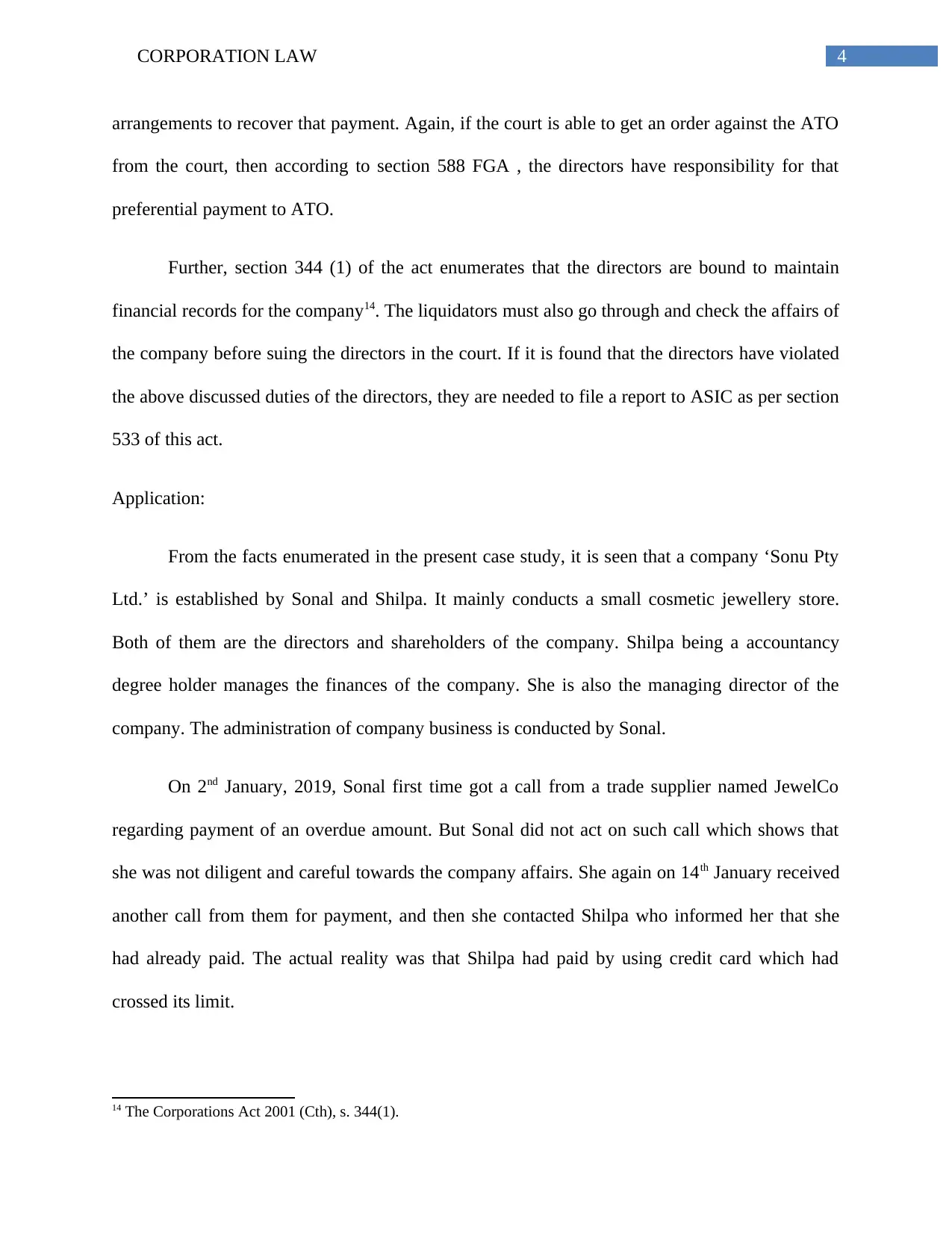
4CORPORATION LAW
arrangements to recover that payment. Again, if the court is able to get an order against the ATO
from the court, then according to section 588 FGA , the directors have responsibility for that
preferential payment to ATO.
Further, section 344 (1) of the act enumerates that the directors are bound to maintain
financial records for the company14. The liquidators must also go through and check the affairs of
the company before suing the directors in the court. If it is found that the directors have violated
the above discussed duties of the directors, they are needed to file a report to ASIC as per section
533 of this act.
Application:
From the facts enumerated in the present case study, it is seen that a company ‘Sonu Pty
Ltd.’ is established by Sonal and Shilpa. It mainly conducts a small cosmetic jewellery store.
Both of them are the directors and shareholders of the company. Shilpa being a accountancy
degree holder manages the finances of the company. She is also the managing director of the
company. The administration of company business is conducted by Sonal.
On 2nd January, 2019, Sonal first time got a call from a trade supplier named JewelCo
regarding payment of an overdue amount. But Sonal did not act on such call which shows that
she was not diligent and careful towards the company affairs. She again on 14th January received
another call from them for payment, and then she contacted Shilpa who informed her that she
had already paid. The actual reality was that Shilpa had paid by using credit card which had
crossed its limit.
14 The Corporations Act 2001 (Cth), s. 344(1).
arrangements to recover that payment. Again, if the court is able to get an order against the ATO
from the court, then according to section 588 FGA , the directors have responsibility for that
preferential payment to ATO.
Further, section 344 (1) of the act enumerates that the directors are bound to maintain
financial records for the company14. The liquidators must also go through and check the affairs of
the company before suing the directors in the court. If it is found that the directors have violated
the above discussed duties of the directors, they are needed to file a report to ASIC as per section
533 of this act.
Application:
From the facts enumerated in the present case study, it is seen that a company ‘Sonu Pty
Ltd.’ is established by Sonal and Shilpa. It mainly conducts a small cosmetic jewellery store.
Both of them are the directors and shareholders of the company. Shilpa being a accountancy
degree holder manages the finances of the company. She is also the managing director of the
company. The administration of company business is conducted by Sonal.
On 2nd January, 2019, Sonal first time got a call from a trade supplier named JewelCo
regarding payment of an overdue amount. But Sonal did not act on such call which shows that
she was not diligent and careful towards the company affairs. She again on 14th January received
another call from them for payment, and then she contacted Shilpa who informed her that she
had already paid. The actual reality was that Shilpa had paid by using credit card which had
crossed its limit.
14 The Corporations Act 2001 (Cth), s. 344(1).
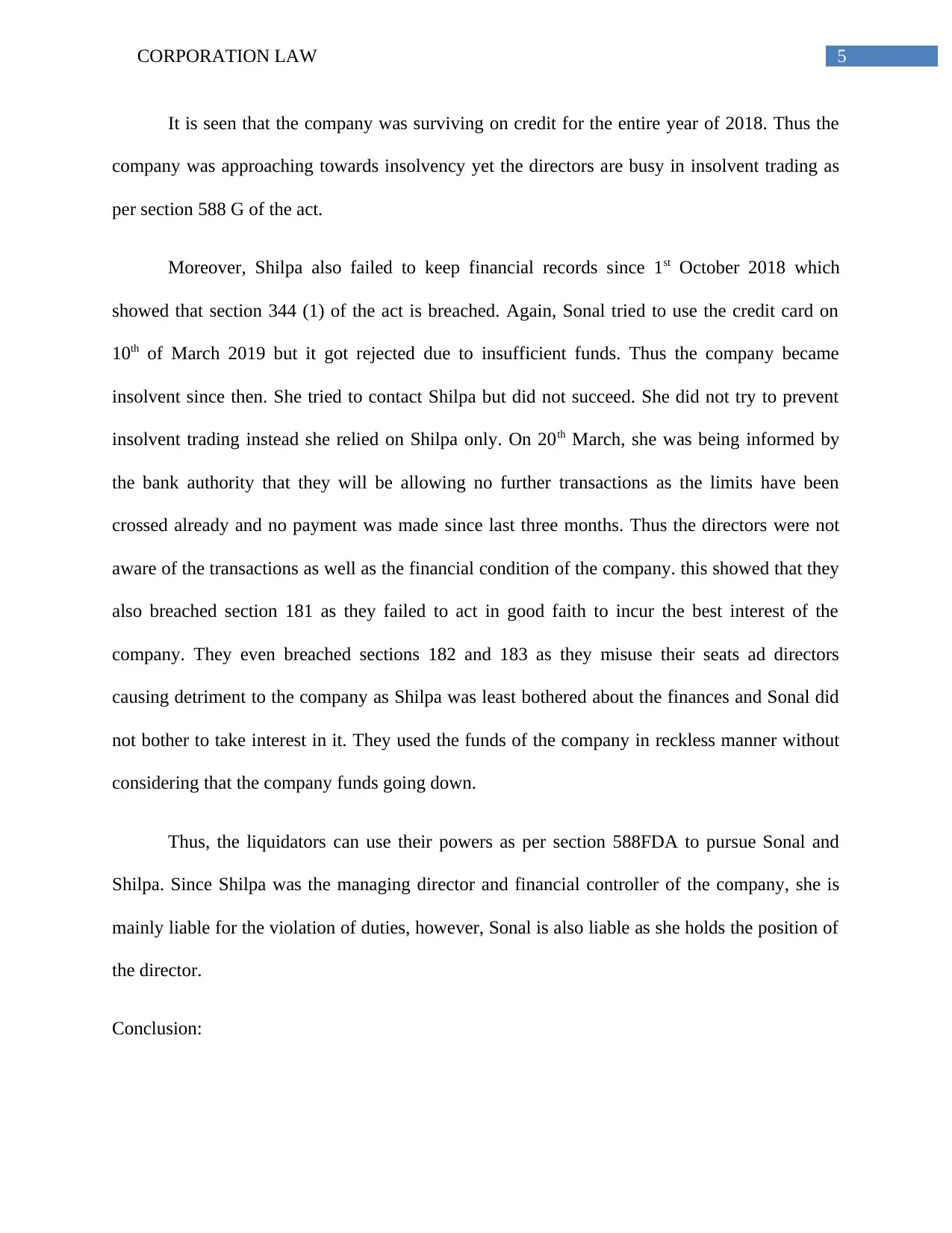
5CORPORATION LAW
It is seen that the company was surviving on credit for the entire year of 2018. Thus the
company was approaching towards insolvency yet the directors are busy in insolvent trading as
per section 588 G of the act.
Moreover, Shilpa also failed to keep financial records since 1st October 2018 which
showed that section 344 (1) of the act is breached. Again, Sonal tried to use the credit card on
10th of March 2019 but it got rejected due to insufficient funds. Thus the company became
insolvent since then. She tried to contact Shilpa but did not succeed. She did not try to prevent
insolvent trading instead she relied on Shilpa only. On 20th March, she was being informed by
the bank authority that they will be allowing no further transactions as the limits have been
crossed already and no payment was made since last three months. Thus the directors were not
aware of the transactions as well as the financial condition of the company. this showed that they
also breached section 181 as they failed to act in good faith to incur the best interest of the
company. They even breached sections 182 and 183 as they misuse their seats ad directors
causing detriment to the company as Shilpa was least bothered about the finances and Sonal did
not bother to take interest in it. They used the funds of the company in reckless manner without
considering that the company funds going down.
Thus, the liquidators can use their powers as per section 588FDA to pursue Sonal and
Shilpa. Since Shilpa was the managing director and financial controller of the company, she is
mainly liable for the violation of duties, however, Sonal is also liable as she holds the position of
the director.
Conclusion:
It is seen that the company was surviving on credit for the entire year of 2018. Thus the
company was approaching towards insolvency yet the directors are busy in insolvent trading as
per section 588 G of the act.
Moreover, Shilpa also failed to keep financial records since 1st October 2018 which
showed that section 344 (1) of the act is breached. Again, Sonal tried to use the credit card on
10th of March 2019 but it got rejected due to insufficient funds. Thus the company became
insolvent since then. She tried to contact Shilpa but did not succeed. She did not try to prevent
insolvent trading instead she relied on Shilpa only. On 20th March, she was being informed by
the bank authority that they will be allowing no further transactions as the limits have been
crossed already and no payment was made since last three months. Thus the directors were not
aware of the transactions as well as the financial condition of the company. this showed that they
also breached section 181 as they failed to act in good faith to incur the best interest of the
company. They even breached sections 182 and 183 as they misuse their seats ad directors
causing detriment to the company as Shilpa was least bothered about the finances and Sonal did
not bother to take interest in it. They used the funds of the company in reckless manner without
considering that the company funds going down.
Thus, the liquidators can use their powers as per section 588FDA to pursue Sonal and
Shilpa. Since Shilpa was the managing director and financial controller of the company, she is
mainly liable for the violation of duties, however, Sonal is also liable as she holds the position of
the director.
Conclusion:
⊘ This is a preview!⊘
Do you want full access?
Subscribe today to unlock all pages.

Trusted by 1+ million students worldwide
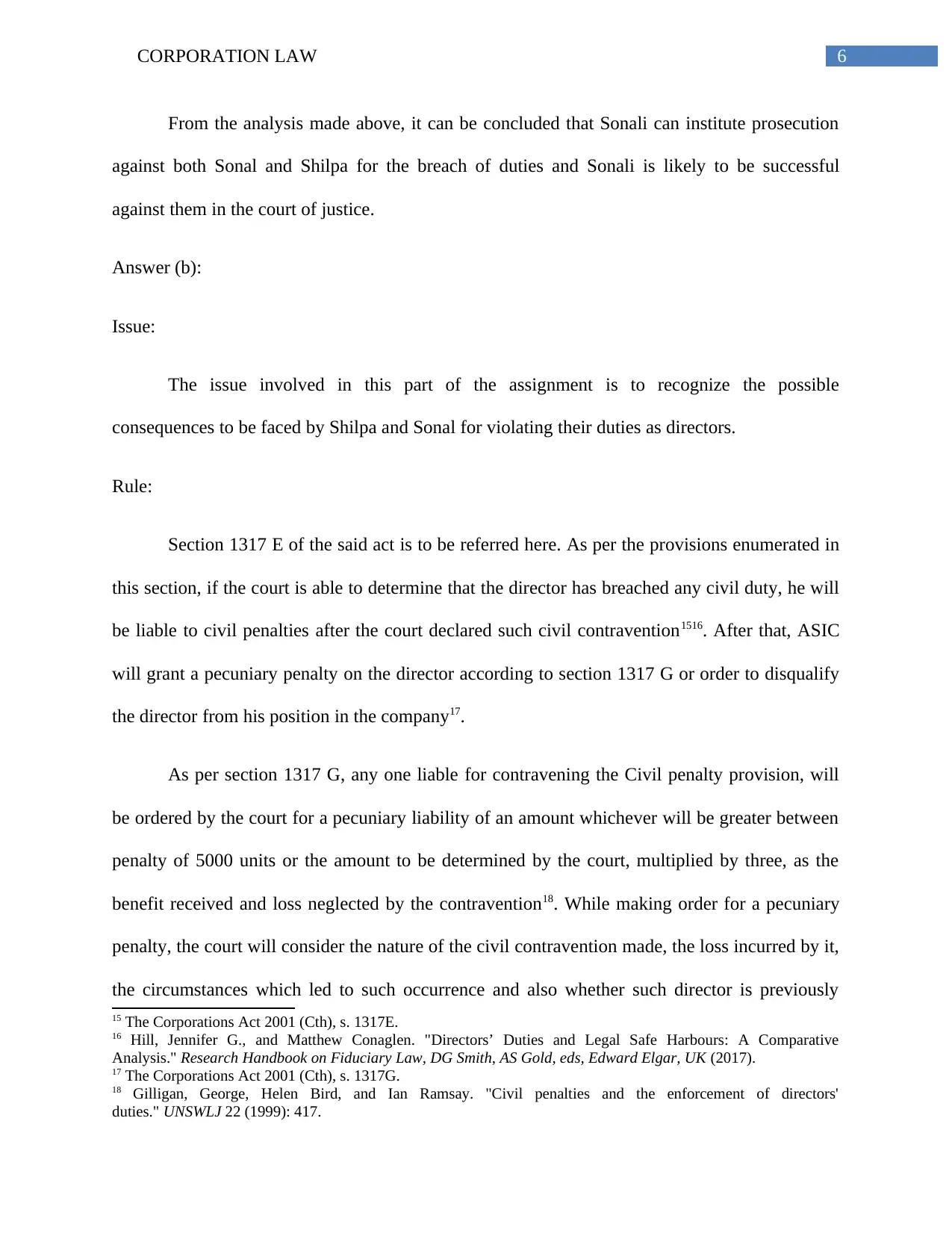
6CORPORATION LAW
From the analysis made above, it can be concluded that Sonali can institute prosecution
against both Sonal and Shilpa for the breach of duties and Sonali is likely to be successful
against them in the court of justice.
Answer (b):
Issue:
The issue involved in this part of the assignment is to recognize the possible
consequences to be faced by Shilpa and Sonal for violating their duties as directors.
Rule:
Section 1317 E of the said act is to be referred here. As per the provisions enumerated in
this section, if the court is able to determine that the director has breached any civil duty, he will
be liable to civil penalties after the court declared such civil contravention1516. After that, ASIC
will grant a pecuniary penalty on the director according to section 1317 G or order to disqualify
the director from his position in the company17.
As per section 1317 G, any one liable for contravening the Civil penalty provision, will
be ordered by the court for a pecuniary liability of an amount whichever will be greater between
penalty of 5000 units or the amount to be determined by the court, multiplied by three, as the
benefit received and loss neglected by the contravention18. While making order for a pecuniary
penalty, the court will consider the nature of the civil contravention made, the loss incurred by it,
the circumstances which led to such occurrence and also whether such director is previously
15 The Corporations Act 2001 (Cth), s. 1317E.
16 Hill, Jennifer G., and Matthew Conaglen. "Directors’ Duties and Legal Safe Harbours: A Comparative
Analysis." Research Handbook on Fiduciary Law, DG Smith, AS Gold, eds, Edward Elgar, UK (2017).
17 The Corporations Act 2001 (Cth), s. 1317G.
18 Gilligan, George, Helen Bird, and Ian Ramsay. "Civil penalties and the enforcement of directors'
duties." UNSWLJ 22 (1999): 417.
From the analysis made above, it can be concluded that Sonali can institute prosecution
against both Sonal and Shilpa for the breach of duties and Sonali is likely to be successful
against them in the court of justice.
Answer (b):
Issue:
The issue involved in this part of the assignment is to recognize the possible
consequences to be faced by Shilpa and Sonal for violating their duties as directors.
Rule:
Section 1317 E of the said act is to be referred here. As per the provisions enumerated in
this section, if the court is able to determine that the director has breached any civil duty, he will
be liable to civil penalties after the court declared such civil contravention1516. After that, ASIC
will grant a pecuniary penalty on the director according to section 1317 G or order to disqualify
the director from his position in the company17.
As per section 1317 G, any one liable for contravening the Civil penalty provision, will
be ordered by the court for a pecuniary liability of an amount whichever will be greater between
penalty of 5000 units or the amount to be determined by the court, multiplied by three, as the
benefit received and loss neglected by the contravention18. While making order for a pecuniary
penalty, the court will consider the nature of the civil contravention made, the loss incurred by it,
the circumstances which led to such occurrence and also whether such director is previously
15 The Corporations Act 2001 (Cth), s. 1317E.
16 Hill, Jennifer G., and Matthew Conaglen. "Directors’ Duties and Legal Safe Harbours: A Comparative
Analysis." Research Handbook on Fiduciary Law, DG Smith, AS Gold, eds, Edward Elgar, UK (2017).
17 The Corporations Act 2001 (Cth), s. 1317G.
18 Gilligan, George, Helen Bird, and Ian Ramsay. "Civil penalties and the enforcement of directors'
duties." UNSWLJ 22 (1999): 417.
Paraphrase This Document
Need a fresh take? Get an instant paraphrase of this document with our AI Paraphraser
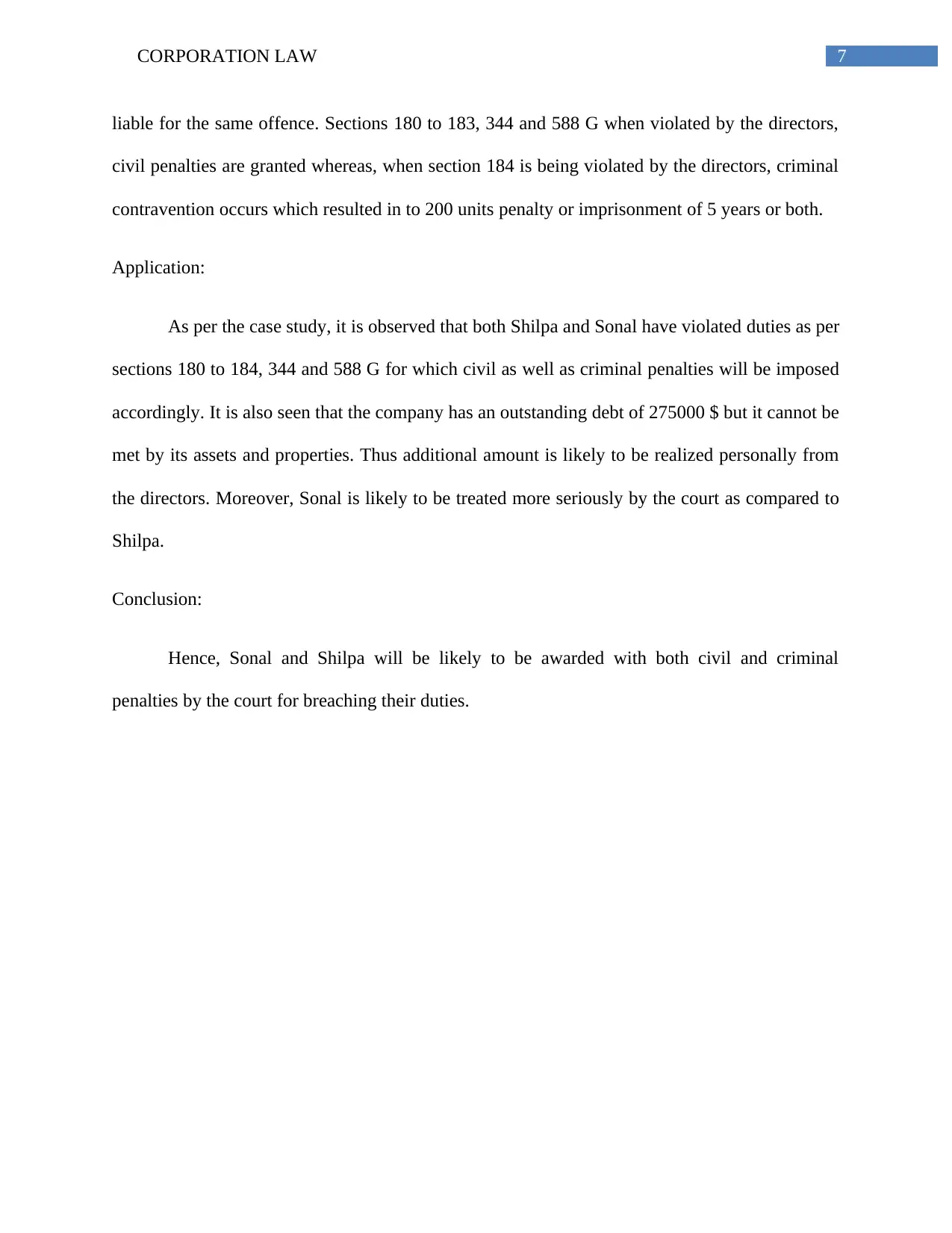
7CORPORATION LAW
liable for the same offence. Sections 180 to 183, 344 and 588 G when violated by the directors,
civil penalties are granted whereas, when section 184 is being violated by the directors, criminal
contravention occurs which resulted in to 200 units penalty or imprisonment of 5 years or both.
Application:
As per the case study, it is observed that both Shilpa and Sonal have violated duties as per
sections 180 to 184, 344 and 588 G for which civil as well as criminal penalties will be imposed
accordingly. It is also seen that the company has an outstanding debt of 275000 $ but it cannot be
met by its assets and properties. Thus additional amount is likely to be realized personally from
the directors. Moreover, Sonal is likely to be treated more seriously by the court as compared to
Shilpa.
Conclusion:
Hence, Sonal and Shilpa will be likely to be awarded with both civil and criminal
penalties by the court for breaching their duties.
liable for the same offence. Sections 180 to 183, 344 and 588 G when violated by the directors,
civil penalties are granted whereas, when section 184 is being violated by the directors, criminal
contravention occurs which resulted in to 200 units penalty or imprisonment of 5 years or both.
Application:
As per the case study, it is observed that both Shilpa and Sonal have violated duties as per
sections 180 to 184, 344 and 588 G for which civil as well as criminal penalties will be imposed
accordingly. It is also seen that the company has an outstanding debt of 275000 $ but it cannot be
met by its assets and properties. Thus additional amount is likely to be realized personally from
the directors. Moreover, Sonal is likely to be treated more seriously by the court as compared to
Shilpa.
Conclusion:
Hence, Sonal and Shilpa will be likely to be awarded with both civil and criminal
penalties by the court for breaching their duties.
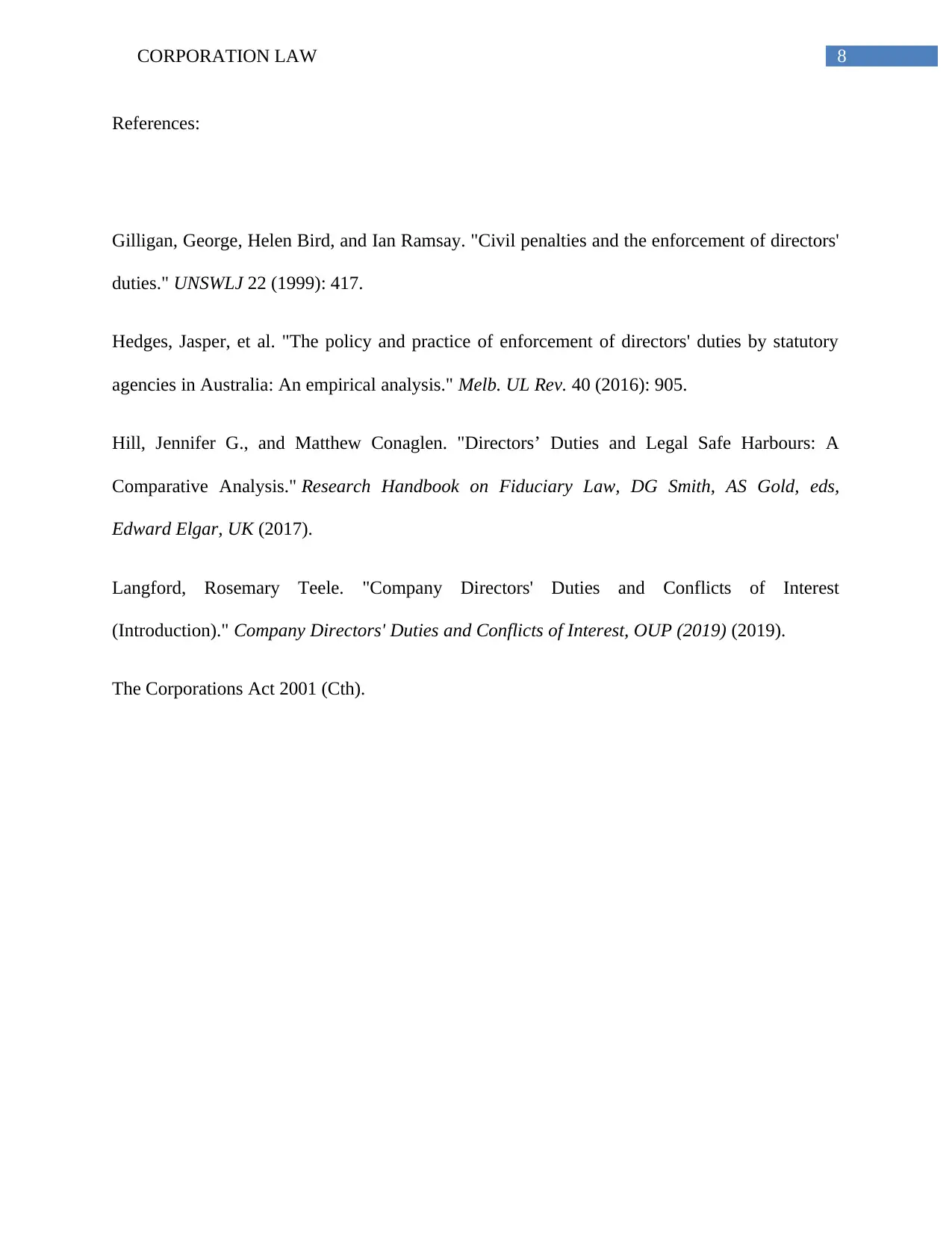
8CORPORATION LAW
References:
Gilligan, George, Helen Bird, and Ian Ramsay. "Civil penalties and the enforcement of directors'
duties." UNSWLJ 22 (1999): 417.
Hedges, Jasper, et al. "The policy and practice of enforcement of directors' duties by statutory
agencies in Australia: An empirical analysis." Melb. UL Rev. 40 (2016): 905.
Hill, Jennifer G., and Matthew Conaglen. "Directors’ Duties and Legal Safe Harbours: A
Comparative Analysis." Research Handbook on Fiduciary Law, DG Smith, AS Gold, eds,
Edward Elgar, UK (2017).
Langford, Rosemary Teele. "Company Directors' Duties and Conflicts of Interest
(Introduction)." Company Directors' Duties and Conflicts of Interest, OUP (2019) (2019).
The Corporations Act 2001 (Cth).
References:
Gilligan, George, Helen Bird, and Ian Ramsay. "Civil penalties and the enforcement of directors'
duties." UNSWLJ 22 (1999): 417.
Hedges, Jasper, et al. "The policy and practice of enforcement of directors' duties by statutory
agencies in Australia: An empirical analysis." Melb. UL Rev. 40 (2016): 905.
Hill, Jennifer G., and Matthew Conaglen. "Directors’ Duties and Legal Safe Harbours: A
Comparative Analysis." Research Handbook on Fiduciary Law, DG Smith, AS Gold, eds,
Edward Elgar, UK (2017).
Langford, Rosemary Teele. "Company Directors' Duties and Conflicts of Interest
(Introduction)." Company Directors' Duties and Conflicts of Interest, OUP (2019) (2019).
The Corporations Act 2001 (Cth).
⊘ This is a preview!⊘
Do you want full access?
Subscribe today to unlock all pages.

Trusted by 1+ million students worldwide
1 out of 9
Related Documents
Your All-in-One AI-Powered Toolkit for Academic Success.
+13062052269
info@desklib.com
Available 24*7 on WhatsApp / Email
![[object Object]](/_next/static/media/star-bottom.7253800d.svg)
Unlock your academic potential
Copyright © 2020–2026 A2Z Services. All Rights Reserved. Developed and managed by ZUCOL.




